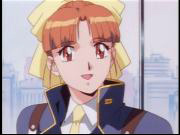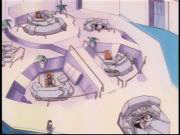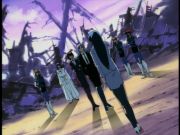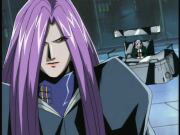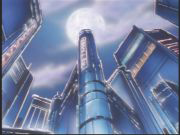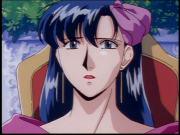

Quick Links:
Silent Möbius original soundtrack vol. 1, Symphony
While attention to detail can be found in many aspects of the Silent Möbius television show, what really grabbed my attention when I first saw the show was the excellent musical score that the show had. Running the gamut from fully-orchestrated works to pop songs to the more standard (for anime) synthesized music, the music of Silent Möbius does an excellent job of supporting the story and adding to, while not overpowering, the emotional power of specific scenes in the show. The soundtrack to Silent Möbius has been released over three discs, each covering the different musical styles utilized in the show. The first CD, Symphony, focuses (as you can probably guess) on the symphonic and related works.
The tracks on the album have a "back-and-forth" feel to them. For example, the first track, "Prelude," relies heavily on foreboding organ music and choral singing and has very dark overtones, which does not set an appropriate tone for the rest of the album. In fact, right after this track is the opening theme, a very upbeat and peppy track, with almost the opposite feel then the preceding song. Yes, "Prelude" is the background music for the opening of the first episode, but thematically it doesn't tie to anything close to it on the album. The approach taken on the album is probably the best way to deal with the varying styles of music on the soundtrack, but it does mean that when you listen to the album on its own the songs generally do not flow from one to the other, which can make for a somewhat awkward listening experience.
Another thing that works against the album's cohesiveness is the variety of composers. Fully five different individuals composed and arranged songs for the album: Ken'ichi Sudoh, Suzie Katayama, Jimmie Haskell, Daisuke Inoue, and Ryomei Shirai. Ken'ichi Sudoh gets the bulk of the work, being involved in seven of the sixteen tracks on the album, and his work is all performed with synthesizers, though it is not really electronica in any way. The music is generally arranged like orchestral music; there just isn't an orchestra. The tracks composed by Suzie Katayama and Jimmie Haskell, however, do utilize an actual symphonic orchestra.
Interestingly enough, Ms. Katayama and Mr. Haskell are both prolific musicians in the North American music scene. Suzie Katayama is an accomplished cellist and arranger who has worked with dozens of American musicians from Lindsay Lohan to Tim McGraw to David Benoit to Sixpence None the Richer, and has been involved in the soundtracks for movies such as Spider Man 2 and The Sweetest Thing. Jimmie Haskell is a long-standing Hollywood and Broadway composer and orchestrator who has been involved in the music for famous films such as When Harry Met Sally, Pulp Fiction, and The Matrix. The inclusion of works by these composers helps give the work a more "American" feel than one would expect from an anime soundtrack. In addition, as these composers have written songs for a number of films, their pieces tend to have a grander, more sweeping feel, more often encountered in feature film soundtracks than in television shows.
Getting back to the music itself, the album is a mixed bag. Additionally, while a number of the songs are quite good, they don't all work well as standalone pieces of music, divorced from the context of the show they were designed to support. The synth pieces by Ken'ichi Sudoh suffer the worst here, such as "The Hope and The Mighty Force." The tracks hint at dramatic tension, but for the most part they don't stand all that well on their own. Trust me, it worked better in the actual show. This doesn't mean that there aren't any good tracks on this album, however. I like both tracks by Suzie Katayama, though both lean melancholy, just like the rest of the album. And track 12, "The Perplexity," by Ken'ichi Sudoh, is an outstanding solo piano piece that really blew me away the first time I heard it. Again, it has a haunted, melancholy feel to it, but it stands superbly on its own and transmits its own emotional feel properly, without relying on the external aid of the show for impact.
The artist that really breaks the melancholy mood is Jimmie Haskell. Outside of the rather odd first track, his works, such as "Tranquility," generally have a positive, if not downright happy, "all is right with the world" tone to them. Even his martial theme, "Destiny," avoids the sadness evoked by the other composers. The final track, "The Creation," also composed by Mr. Haskell, does a decent job of tying all of his pieces together, and is a solid triumphal piece to indicate that yes, the good guys do win after all. It sounds more like something you would hear in a movie while the end credits were rolling, rather than in a TV show.
I would be remiss if I didn't mention that this album, like all good soundtracks, includes the opening and ending themes of the show, even though they are not orchestral pieces by any means. Alas, we only get the TV edits and not the full versions, but that will have to suffice. The opener, "The Forbidden Pensee," is a rockin' tune that I have always liked since I first heard it. The closer, "Silently," is an odd little number, and rather depressing if you really listen to it. It is simple from a musical standpoint, and I don't care for it all that much, but it is good to have it present, for the sake of completeness.
So, in the end, this album is a mixed bag. There is definitely some excellent music here, but the arrangement makes it difficult to listen to the whole thing, straight through. When I'm in the mood, I just go straight to the specific tracks that I want to hear, and skip the rest. My advice is to make sure there is enough good here to warrant your money, or find a used copy for cheap.

